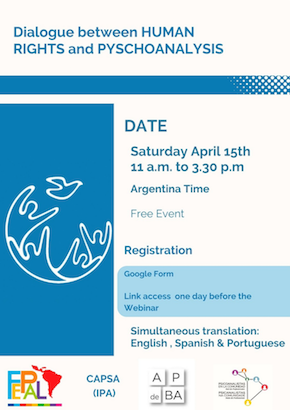Dialogue
between Human Rights and Psychoanalysis
I had the privilege of being invited to engage in the webinar titled "Dialogues between Human Rights and Psychoanalysis," organized by FEPAL's Community and Culture Department in collaboration with its study group, "Psychoanalysts in the Community."
Serving as a commentator within the session themed "Psychoanalytic Training and Human Rights in Our Institutions," I am pleased to share the reflections presented in the following text. R. M. N. (April, 2023)
_________
The two themes discussed today are of enormous importance because they highlight the involvement of psychoanalysis in the community and we notice how essential it is for us psychoanalysts to get out of our offices and our individuality to meet the collective. As previously mentioned by Paola, it is important for psychoanalysis to assume its social and civic responsibility.
In a country like Lebanon, collective movements and collective traumas are very present and basic human rights violated. These past years the country is going through multiple crises that affect all dimensions of the daily life of its citizens. It started with the October revolution in 2019, followed by a socio-economic collapse, which continues until now with no end in sight. This is accompanied by shortages of petrol, medicines, food and health products and much more. In addition, the explosion in the port of Beirut on August 4, 2020 destroyed a large part of the capital. On top of this, there was the coronavirus pandemic which seemed the least harmful among the other crises. Each event in itself brings back older traumas from the time of the 1975-1990 civil war and all the other wars that followed.
Lebanon is located in an unstable geopolitical area, and it is a country that has always experienced political and security instability.
Many psychoanalysts have wondered and written about the war.
Maurice Khoury, who is the current president of our society and one of its founding members, wrote in 2017 an article called “Wars: Cultural pluralism and psychoanalytical practice”. In this text he tries to show how, with and in spite of the Lebanese war of 1975 which broke out on the basis of religion, confession and regional interests, psychoanalysis was nevertheless able to establish itself in a country with continuous political and military upheavals. When the war was raging, clinical practice was obstructed by the armed conflicts and it was difficult for patients to reach their sessions, which did not prevent the foundation, in 1980, of the first psychoanalytical society in the Arab Middle East. Since then, and from this first society (Lebanese Society of Psychoanalysis), groups and associations have emerged. The latest one, the Lebanese Association for the Development of Psychoanalysis (ALDeP), has set itself the goal of transmitting psychoanalysis according to internationally recognized models; Founded in 2009, it is attached to the IPA since January 2010.
Khoury also describes moments of his training as a psychoanalyst when he had to go to his sessions with his analyst. He remembers the bombings that occurred during or before the sessions. “The conflict was at its height between the desire to go to the session and the desire to abstain, knowing the risk.”
Marie Therese Khair Badawi who is also a founding member of our society in her text “Being, thinking, creating: When war attacks the setting and the transference counter-attacks” questions the work of the analyst when he lives in a context where the unexpected commands. What happens to the analytic framework when it is subjected to the unpredictable? How to protect it? What happens when the analyst and the analysand are caught in the same traumatic situation? She gives clinical examples of situations in which the analyst is no longer the guardian of the objective framework but becomes the framework to insure the continuity of the analysis with the patient.
To return to the question of psychoanalytic training today. ALDeP had just changed its status from "Study Group" to "Provisional Society" with the IPA and the analysts in training had become members, when the series of events we mentioned earlier were triggered in Lebanon. This caused the members to disperse and travel especially the young ones who did not want to inflict on their families to relive the war. I am one of those members who left the country. A question of continuity arose in regard to a group that had just emerged and consolidated, it is only natural to wonder if it would hold on especially after the explosion of the port of Beirut which blew up with it many of our offices located in the capital not far from the port.
After the experience of the online work that was established following the pandemic, we continued our institutional meetings on Zoom. These meetings for work and gatherings have allowed us to put back in place a containing structure for the institution. Thanks to a collective effort and driven by the desire to continue the transmission of psychoanalysis despite the external reality, the group has been carried by the desire of everyone but also by the benevolence of the senior members of the group who by their resistance and resilience have facilitated the return of the younger members and also continue to give to the community by organizing online conferences and various scientific activities that continue to attract interest in psychoanalysis in Lebanon and new requests for training at ALDeP.

